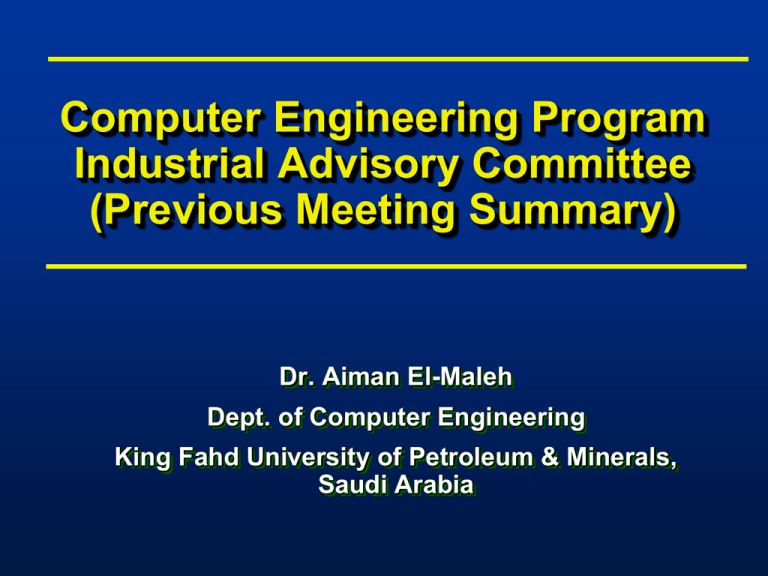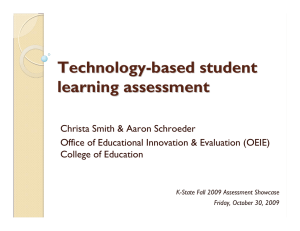Computer Engineering Program Industrial Advisory Committee (Previous Meeting Summary)
advertisement

Computer Engineering Program Industrial Advisory Committee (Previous Meeting Summary) Dr. Aiman El-Maleh Dept. of Computer Engineering King Fahd University of Petroleum & Minerals, Saudi Arabia Outline Industrial Advisory Committee Role Industrial Advisory Committee Members Previous Meeting Agenda Input Provided by Members of IAC Summary of IAC Survey Actions Taken by COE Department 2 Industrial Advisory Committee Role Review of department area of concentrations and recommend some enhancement to undergraduate program in some specialized areas. Provide inputs on the undergraduate student qualifications and skills based on new trends and local industry needs. Provide feedback on the Educational Objectives and Program Outcomes and their implications on the program curriculum. Provide feedback on the achievement of program outcomes by our graduates. 3 Industrial Advisory Committee Members (External) Dr. Khalid Al-Biyari, Senior Vice President, Advanced Electronic Company, Riyadh. Mr. Ali A. Al-Masari, Superintendent, Communications Operations Department, Saudi Aramco, Dhahran. Mr. Masud Eid Al-Amiri, General Manager, Information Technology Services, SABIC, Riyadh. Mr. Ahmad Ashadawi, President, Al-Falak Electronic Equipment & Supplies Co, Al-Khobar. Mr. Alaa Abunijem, MS, PMP, Energy Team lead and Strategic Relations Manager, Middle East, Turkey and Africa, Intel Corporation, Riyadh. Mr. Aiman H Mufti, Supervisor, Technical Knowledge Sharing Unit, Engineering Knowledge & Resources Division, Saudi Aramco, Dhahran. 4 Industrial Advisory Committee Members (Internal) Dr. Adnan Gutub, Chairman Computer Eng. Dept. Dr. Mayez Al-Mouhamed, Professor Dr. Aiman El-Maleh, Associate Professor Dr. Ashraf Mahmoud, Assistant Professor Dr. Basem Almadani, Assistant Professor 5 Previous Meeting Agenda Introduction to COE department programs and facilities Review of ABET accreditation process, the role of Industrial Advisory Committee (IAC), and the efforts undertaken by the COE department towards this goal Receive feedback and recommendation of IAC regarding the department Program Educational Objectives, accreditation process Agree on IAC meeting frequency and the mechanisms needed for the IAC to assume their role. Question & Answer session addressing COE program depth and breadth, market needs, COOP & summer training, COE graduates 6 Input Provided by Members of IAC Issue#1: Quality of Computer Engineering Graduates: • • Communication & Presentation Skills of COE Graduates: • lack of communication and presentation skills in COE-KFUPM graduates, in general. Quality of COE Graduates: • lack of exposure to current developments in information technology. 7 Input Provided by Members of IAC Issue # 2: COE Department-Industry Interaction: There is an urgent need to improve COE faculty-industry relations: • Faculty Exposure to Industry: • • Faculty should bring case studies related to their subjects from local industrial sections. • Dr. Khalid Al-Biyari extended an invitation for the faculty to spend a week’s time in his industry. Research Interaction with Industry: • Means for strengthening the involvement of faculty in solving local industrial problems need to be investigated. • The possibility of forming a strong partnership with industry may be an avenue to be investigated. 8 Input Provided by Members of IAC Issue # 3: Effectiveness of Coop and Summer Training Programs: • • • • 9 Coop students from KFUPM are focusing on mere reporting to the department rather than presenting their learning experience. Some students’ coop/summer training reports are well written but their level of work presentation is very low. Develop ways and means for making this experience more effective in making the student professionally more stable and aware of real life problems in the industry. Suggested to look at the successful stories and experience faced by COE ALUMNI for achieving their goal in their life Input Provided by Members of IAC General Comments • • • • • 10 Add a course of Engineering Economics (to be core) Mr. Alaa Abunijem said that COE graduates lack wider exposure to High-performance Computing and Software areas, whereas department has a stronger VLSI area. Dr. Khalid Al-Biyari said that by concentrating on system design projects, more emphasis on system integration using available components is needed. Mr. Ahmad Ashadawi stated that there is no data research, and there is an urgent need to develop top most quality and capability access to massive data - data storage, retrieval, analysis, management and security. COOP work plan should be identified ahead of time for sending the students to the respective industry/company for coop or summer training program. Summary of IAC Survey Inputs on the Educational Objectives: • Good objectives, however, you need some focus on few areas to shine in and gain regional and WW reputation. • There is a breadth but not much depth in the overall objectives. • Provide graduate engineers with ability of supporting the industry in the following fields: Communication network design, and Embedded system design Inputs on the Program Assessment Method: 11 • Reasonable. • Very good. Summary of IAC Survey Inputs on the Program Outcomes: • Program outcomes are fine and the only suggested improvement is to stress more practical disciplines. • Students should specialize and go in depth in specific • • 12 disciplines that will make them productive faster. Outcome of the program need some improvements, since we are now competing in WW level, not local level. Companies now look for skilled employees regardless of their physical locations. Students graduating from KFUPM are very good especially in work ethics. However, they lack specialization. It will be better if the last 2 semesters at minimum, are dedicated to specialization. Summary of IAC Survey The COE program needs to improve the listed below graduate abilities, attributes and skills which are estimated to be important for the Industry: • • • • • • • • • • 13 Design a system, component to meet a desired need (1) Analyze and interpret data from experiments (1) Communicate orally: informal and prepared talks (2) Communicate in writing: letters, technical reports, etc. (2) Ability to use state of the art techniques, and tools (2) Recognize professional and ethical responsibility (1) Function on multi-disciplinary or cross-functional teams (all) Use computing technology in communications (all) Understand the contemporary issues surrounding him (all) Use computing technology in engineering analysis/design (1) Summary of IAC Survey 14 List three most useful knowledge, skills, and professional tools that you think should be taught in the COE Program prior to be eligible to the CO-OP or Summer Training: • Automated Office skills (Word/Excel etc...), learning how to search the internet for information, technical writing skills, and how to write reports • Developing applications using Microsoft and Sun technologies • Understand the infrastructure design using Microsoft and Sun environments including networking and storage designs, and troubleshooting skills and analysis. Summary of IAC Survey • In depth technical knowledge in practical areas • • 15 relevant to need of local and multinational companies operating in the region. KFUPM need to assess the need of the industry and focus more in area that is more relevant. For example HPC computing is needed locally but no in-depth knowledge. Programming in C and C++, Study of industrial standard C51 microcontroller, and get familiar with the use of the microcontroller development tools, like compiler, simulator, in-circuit emulator. Summary of IAC Survey 16 What should be done to improve the COE Education at KFUPM? • More interaction with the local industry. • Capitalize on local and related technologies to address country challenges • Increase the exchange of skills and knowledge between world class universities in related fields, • Introduce the distance learning / video conferencing in the related fields. • More up-to-date dynamic curriculum to reflect the ever changing technology. • Enhance the laboratory skills, study software quality, and study embedded systems operation system. Summary of IAC Survey 17 What should be done to improve the professional partnership between the COE and the Industry? • Match KFUPM programs with industry requirement by having faculty spend time in industry. • Conduct Knowledge Transfer Sessions where industry and education exchange their experience and skills • Introduce industry challenges to the education sector to address these challenges through senior projects or special studies • More frequent visits of students and Faculty to Industry • Encourage graduate students to do their projects on areas having direct impact on the local needs. • Getting advisors from Industry Actions Taken by COE Department All KFUPM students required to take ICDL Engineering economy is a core in the new curriculum New curriculum is designed with minimum core requirements with increased number of electives • Allows more flexibility in program • Focuses on more in-depth in selected tracks Catalog description of computer architecture courses revised to address HPC requirements • COE 403 – Advanced Microprocessor Architecture • COE 420 – Parallel Computing 18 A High-Performance Cluster has been arranged at the Information Technology Centre (ITC). Actions Taken by COE Department The courses COE 400 "Embedded Systems" and COE 305 "Microprocessor Systems" have been revised and restructured to better address system design project integrating hardware and software components. One undergraduate course on Data Management is introduced and being offered as elective course. COE students are exposed to Oral and Written communication at all levels: • Technical report writing (ENGL 214), • Seminar (COE 390), • Set of course projects where a technical report is required • COE 400 "Embedded Systems" • COE 485 "Senior Design Project" 19
